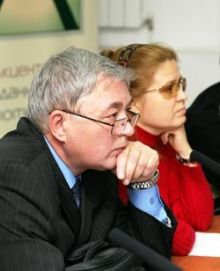On Nov. 25, 2009, a group of Ukrainian intellectuals sent an open letter to Prime Minister Yulia Tymoshenko about ways to bridge the communications gap between Ukraine and the world.
“Care for national culture, its promotion in the world, and securing extensive and effective cultural communications are the sacred duties of every country. The globalization processes only add urgency to this task. Without a clear-cut strategy and active policies along this line, a nation runs the risk of being unknown and uninteresting to others,” reads the letter.
The Day before it was signed the authors gathered the interested participants for the roundtable “Ukrainian culture and the world: ways to bridge the communications gap” held in the Ye bookstore. Volodymyr Panchenko, professor at Kyiv Mohyla Academy and editor of the Internet edition LitAktsent, Yurii Makarov, chief editor of Ukrainsky Tyzhden, Yulia Oliinyk, director of the Tempora Publishing House, Ostap Slyvynsky, Lviv-based poet, essay writer, and translator, and others discussed, in particular, the need to promote translation programs in Ukraine and open and support Ukrainian cultural centers abroad.
It should be noted that these issues have been raised before and not only by this group.
Oxana Pachliowska has long been speaking about the need to have Ukrainian cultural centers and university departments abroad. She has submitted her proposals to the government (she first did so long before Tymoshenko became the prime minister) but to no avail.
Furthermore, with the support of the British Council and the Open Ukraine foundation, the 2009 Publishers Forum in Lviv hosted a breakfast discussion which involved Ukrainian and foreign writers, translators, and publishers and was called “What does Ukrainian literature need in order to be successful abroad?” One of present Russian writers then said: “Guys, why are you complaining? With your Kurkov, Deresh, and Andrukhovych there is no room left for others on the shelves of European bookstores! I went to the central bookstore in Paris, and saw Kurkov all over the place!”
This fact cannot but warm the heart. However, this success is the exclusive merit of the authors and publishers. Support for Ukrainian literature abroad depends on the efforts of the specific Ukrainian embassy in a given country rather than on a state program. At the same time, for most Ukrainians, Ukrainian literature is, above all, embodied in Shevchenko, Franko, Lesia Ukrainka, and other classics. We wish the world to associate Ukraine with these names. Meanwhile, the latest English-language translation of Shevchenko’s works by the talented translator Vira Rich had the miserable press run of 500 copies. So much for the presence of Shevchenko’s genius in the world.
The litterateurs keep appealing to the government, using these arguments and demanding a meeting and discussion with qualified representatives of the Foreign Ministry, the Ministry of Culture and Tourism, and the Ministry of Education and Science. However, there were quite a few skeptics even at the roundtable. First, a good beginning requires, most importantly, implementation. Second, there are doubts about the efficiency of the addressee, i.e., the Ministry of Foreign Affairs, and not only because it is not directly subordinated to the prime minister. The matter is more in the values held by both the government and the ministry in question.
It happened so that the roundtable took place in a room with a large stand filled with foreign-language textbooks — from the traditional English, German, French, and Italian to the less common Czech, Chinese, and Arabic. This fact seemed to provide at least a partial answer to the question posed by the roundtable participants: How much is Ukraine open to the world and world literature? Ukraine, no doubt, wants to know the intellectual achievements of the world, and it does. However, this intellectual connection is more of a one-way street, which is largely our fault and the fault of those we elect.







